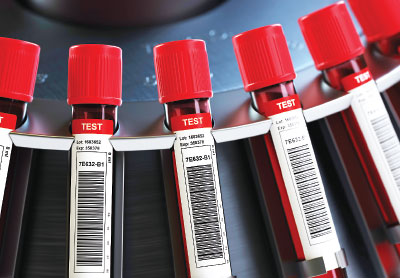Although the only way to confirm Alzheimer’s disease remains after death, researchers have spent decades searching for a reliable blood test for Alzheimer’s disease. Two studies appearing in Nature Medicine suggest scientists are getting closer to achieving this goal. These related studies show that analyzing the levels of a protein called tau in blood can differentiate people with Alzheimer’s from those without cognitive impairments as well as those with other dementia disorders.
Numerous studies point to the abnormal accumulation of tau in the brains of patients with Alzheimer’s disease. The findings suggest measuring the protein in patients’ blood may offer a less invasive and less expensive alternative to spinal fluid analysis and brain imaging—the currently approved methods for making “likely” Alzheimer’s diagnoses.
The two new studies specifically assessed the predictive value of a form of tau called phosphorylated tau181 (P-tau181).
Both studies—the first led by a team at Lund University in Sweden and the second by investigators at the University of California, San Francisco—were similar in scope. Each one involved large cohorts of older patients who had varying degrees of cognitive problems (including many who were healthy at baseline) and were followed for several years. The participants provided periodic blood, spinal fluid, and brain imaging samples, which enabled the researchers to compare the accuracy of different diagnostic methods. Postmortem autopsies were done on some of the participants to confirm their type of dementia. The total sample included over 900 adults from six different cohorts.
These studies found that P-tau181 levels in the blood correlated to tau levels in the spinal fluid and the brain. They also found that P-tau181 levels rose as participants experienced more cognitive problems; levels were low in healthy individuals, higher in those with mild cognitive impairment, and highest in people with likely Alzheimer’s. P-tau181 was not significantly elevated in people with other neurodegenerative disorders such as frontotemporal dementia.
The blood test was able to distinguish patients with Alzheimer’s from those with other neurodegenerative disorders (including samples confirmed via autopsy) with over 90% accuracy. In these samples, the blood tests were only three to four percentage points less accurate at diagnosing patients than spinal fluid tests or brain scans.
In addition, both studies found that people with elevated P-tau181 levels at the start of the study were likely to experience greater declines in cognitive test scores over the next few years than those with lower P-tau181 levels. This suggests that such a test could not only help provide an Alzheimer’s diagnosis, but also identify people who might benefit from early intervention strategies.
The investigators in both studies stressed that this P-tau181 blood test would not replace existing diagnoses made with brain scanning or spinal fluid analysis. A blood test would rather serve as a first-line assessment to identify people who might need more thorough diagnostics. In addition, such a blood test would be valuable to determine participants for inclusion in Alzheimer’s clinical trials.
“Finding a blood test that specifically identifies the presence of Alzheimer’s pathology in the brain should greatly help researchers develop better treatments for the many who suffer from dementia,” said Roderick Corriveau, Ph.D., a program director at the National Institute of Neurological Disorders and Stroke (NINDS) in a press release.
The U.S.-led study was supported by multiple grants from the National Institute on Aging, NINDS, and the National Center for Advancing Translational Science. The Swedish-led study was supported in part by the European Research Council, the Swedish Research Council, and the Swedish Alzheimer Foundation. ■
“Plasma P-tau181 in Alzheimer’s Disease: Relationship to Other Biomarkers, Differential Diagnosis, Neuropathology, and Longitudinal Progression to Alzheimer’s Dementia” is posted
here.
“Diagnostic Value of Plasma Phosphorylated Tau181 in Alzheimer’s Disease and Frontotemporal Lobar Degeneration” is posted
here.

